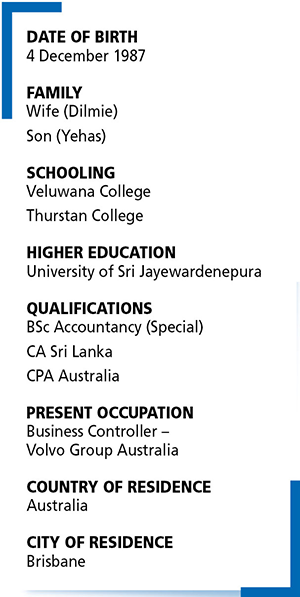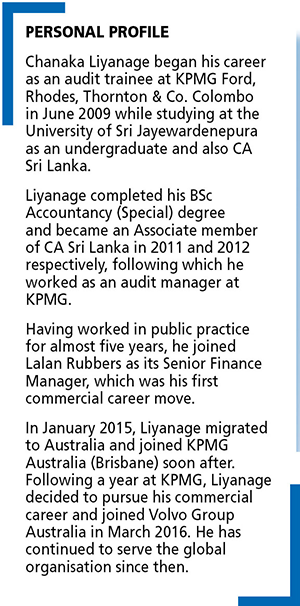SRI LANKANS OVERSEAS
THE SOFT TOUCH
Chanaka Liyanage finds a space to fine-tune our diplomacy
Q: How do compatriots in your country of domicile view Sri Lanka?
A: Sri Lanka has a great history and it’s also a beautiful country with extensive biodiversity. The island is capable of evoking poetry in the minds of foreigners. Those living outside Sri Lanka who have heard of or visited the country love it.
It is the same for people who live in Australia – there’s a positive view of Sri Lanka not only among Australians but also those of other nationalities who live here. But of course, civil conflicts of the past have led to some degree of hesitation.
Another aspect of the strengthening relationship between Sri Lanka and Australia is the mutual love of cricket.
Q: And how do you perceive Sri Lanka today?
A: Unfortunately, Sri Lanka is not progressing as a country. Of course, some positive initiatives can be observed in certain sectors or industries but on the whole, a lack of attention on the part of the authorities responsible is evident.
 Q: What were your impressions of Sri Lanka on your last visit and how much has it changed from the past?
Q: What were your impressions of Sri Lanka on your last visit and how much has it changed from the past?
A: Over the past three years since I moved to Australia, I’ve visited Sri Lanka every year. Therefore, I haven’t been away long enough to witness a notable change. But I notice a gradual change to a more positive and optimistic view regarding the future of Sri Lanka, and opportunities to grow and prosper. Social media has largely influenced this.
Our political tradition should certainly be reformed with a new generation coming into power – at least, that is my belief. The world is interconnected today. Regardless of whether one is in Europe, Africa or Southeast Asia, we’re all influenced by international trends and societal development. Sri Lanka is no exception to this.
Q: How do you view the brain drain and why is there still no reversal of it?
A: Brain drain often occurs as a result of a country’s failure to appropriately fulfil the requirements of the most educated and talented in the workforce.
My standpoint on the brain drain in Sri Lanka is that it’s mainly driven by the better quality of life in other countries and not always about better wages. Equality, law and order, and equal education opportunities are as important as potential earnings.
Educated and skilled members of the workforce evaluate and compare current living standards with those offered for similar professions in developed countries. When they realise there are opportunities for a better life in other countries, it encourages emigration.
Leaders in Sri Lanka should focus more on understanding the factors causing brain drain and initiate action to minimise it in the future by facilitating a better quality of life while working to entice talented Sri Lankan expatriates to return to their land of birth.
Q: What should Sri Lanka focus on most in the coming decade?
A: Sri Lanka’s main focus should be on uplifting the nation’s economic profile through effective management of the extensive natural and human resources it possesses. The country should also take action to foster a productive workforce in the state sector and work to eliminate corruption.
To compete and progress in the international community, Sri Lanka should begin to engage in ‘soft diplomacy’ more systematically. Cultural values supported by ancient history, biodiversity, the arts and music, literature, opportunities for growth in tourism and cuisine would be Sri Lanka’s most distinctive assets in terms of soft diplomacy.
Q: And what are your hopes for the country in the next decade or so?
A: I would like to see a change in people’s attitudes.
Improving the country’s educational system is key to success. While the right to education should be available across the island, the education system requires changes to address varying needs locally as well as to meet the demands of international opportunities.
This will lead to a culture or society where not only conventional professionals such as doctors, engineers and accountants are valued, but also where professions requiring more technical skills such as carpentry, plumbing and firefighting are also respected and rewarded.
Furthermore, all Sri Lankans should maintain peace and harmony. It was an expensive affair to earn this peace and it’s crucial to work hard to recover as much as possible in terms of missed opportunities from the almost 30 years lost due to the war.








Leave a comment